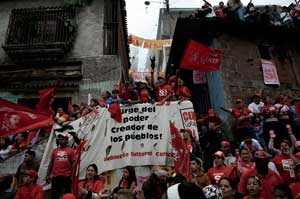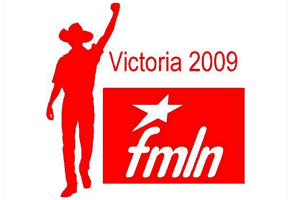Roger Atwood has previously reported for Mother Jones from Iraq and Peru. This guest blog entry is a post-election follow up to his recent dispatch from El Salvador.
El Salvador’s long civil war finally ended on Sunday night. As election results trickled in showing victory for Mauricio Funes, presidential candidate of the guerrilla group-turned-political party Farabundo Marti National Liberation Front, the streets around FMLN headquarters in San Salvador filled with people wearing red shirts, waving red flags, and chanting a line popularized by the president of the FMLN’s former archfoe, the United States: “Yes, we could!”
Pickup trucks jammed with flatbed-riders and buses crammed with celebrating passengers crisscrossed the city into the night, red flags flapping behind them. The fact that many, if not most, of these celebrants were too young to remember the actual war did not change the fact that the promise of the 1992 peace agreement that ended the fighting and created a pluralist political system has finally been fulfilled. Through fair elections, Salvadorans chose the first genuinely left-wing government of their history. The ruling Nationalist Republic Alliance, or ARENA, which formed in the early 1980s with the express goal of stopping el comunismo, has collapsed under its own weight after 20 years in power. “This result says to the world that El Salvador is prepared for democratic alternation in power,” Funes told cheering supporters. “Tonight, Salvadorans have signed a new peace agreement.” The ARENA candidate Rodrigo Avila was sullen but gracious, saying in his concession speech, “When we said we would accept whatever result there was, we meant it.”
One learns not to get one’s hopes up in a country that has seen as much betrayal and war as El Salvador, but this time it does look like the democratic transition is complete.
Funes takes office on June 1. He is going to face high expectations and tough odds. The economy relies on remittances from Salvadorans living abroad, and remittances are in sharp decline. At 55 homicides per 100,000 people, the crime rate is one of the highest in the world and intimately tied to the family disintegration caused by mass emigration. Even foreign trade has fallen far short of expectations, despite ARENA’s ambitions for a globalized role: El Salvador’s trade deficit rose to $5.2 billion last year, a sad performance for a small, export-driven economy.
Funes’ task wouldn’t be easy for any new leader, but he will be even more vulnerable because he has no experience in government. He was a television talk-show host who, by his own account, asked the old guerrilla leadership to let him run as their candidate because he was sick of ARENA misrule and the FMLN’s inability to defeat it. His only contact with the war was as a TV reporter covering it. The fact that Funes was able to parlay his fame into the presidency says plenty about the power of television in Latin America today and about the desperation of the FMLN’s leaders to win after failing in three previous elections. They think he owes them more than they owe him. “No matter how talented he is, Mauricio wouldn’t be where he is right now, as the certain next president of this country, if he were not the candidate of the FMLN. It’s that simple,” said Roberto Lorenzana, an FMLN congressman, before the election.
“Funes has a great capacity to draw crowds, but that would not be possible without the political force known as the FMLN” behind him. Such statements hint at tension between Funes and the guerrilla old guard—nothing to derail his government, probably, but potentially enough to keep things off balance for a while. The historic dimension of his victory should bring him some international goodwill and understanding. He and his team have cultivated good ties with Brazil’s Luiz Inacio Lula da Silva and with the Democrats in the United States. Much of the FMLN’s old guard has hitched its wagon to Venezuela’s Hugo Chavez, with whom Funes has taken a more standoffish posture, at least in public. That, too, could be the source of some friction as the FMLN carves out its international profile. For many on El Salvador’s long-suffering left, however, nothing can diminish this transcendent moment.
Yesterday, just before the polls closed, I went to see Matilde Elena López, an essayist, poet, and important communist intellectual figure in Latin America in the 1950s. Writers of her generation endured constant exile and persecution at the prime of their lives. Now in her 90s and a bit batty, she had dutifully gone to vote and was sitting alone in her living room surrounded by diplomas, awards, and books. I asked her what it was like to see, at last, the left about to win her country’s presidency. “We are all here together now, all of us,” she said. I wasn’t sure what she meant, or if she was slipping into another run of dementia. Then her eyes seemed to clear, and she added, “Va a ser formidable, formidable.”
Roger Atwood, author of Stealing History, has previously reported for Mother Jones from Iraq and Peru.















